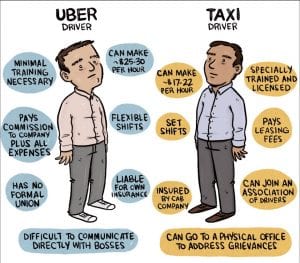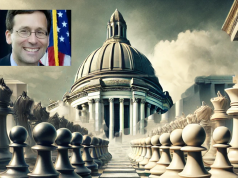A different kind of “travel ban” has been lifted by a Seattle judge. The state court has cleared a snarl of recent lawsuits and paved the way for Seattle to implement a landmark law allowing freelance drivers for ride-hailing companies like Uber and Lyft to unionize.
The original law was passed unanimously by the Seattle City Council in December of 2015 allowing drivers for ride-hailing apps to unionize and collectively bargain for better working conditions, fair earnings, and other employment benefits. The bill was a victory for the App-Based Drivers Association, which had lobbied with the local Teamsters union on behalf of freelance contractors.
Uber and Lyft declined to challenge the first ruling, instead throwing in behind a lawsuit brought by the pro-business, anti-union US Chamber of Commerce. But in August, the Chamber’s lawsuit was tossed out of court, found to be premature until the city moved forward with implementation.
The Chamber has since refiled its suit, arguing that the new group of unionized drivers would violate federal labor laws. Another anti-union group, named the Freedom Foundation, has also filed a challenge against the law.
Dawn Gearhart, business representative for Teamsters Local 117, praised the judge’s ruling. “The city is two-for-two,” she told The Verge, an online news magazine, referring to two court challenges the law has now overcome. “But there’s still two more.”
“While it’s encouraging to have favorable legal decisions, drivers are struggling for basic dignity and a living wage while Uber forces the city into court,” Gearhart added. “Conditions are getting worse and drivers won’t see meaningful change until they have a voice.”
Meanwhile, Uber won’t say whether it intends to appeal the judge’s ruling, but the company did criticize the scope of the law, which only applies to drivers who complete a certain number of trips and have been driving on their respective platforms prior to the law’s January implementation.
“The city’s collective bargaining ordinance rules deny thousands of Seattle drivers a voice and a vote on their future,” said Brooke Steger, Uber’s general manager for the Pacific Northwest, in a statement. “We were forced to pursue a novel legal approach because the city provided no other way to challenge this deeply flawed process. We appreciate Judge Andrus’s consideration of the suit. Seattle should be working to give drivers a voice rather than denying them one. We will continue to look for ways to raise these very serious concerns.”
Last year, The Verge uncovered evidence of Uber using a CIA-linked firm to investigate union politics in Seattle. Uber acknowledged the project and characterized the effort as research into the city’s political landscape, emphasizing that it was not targeted at any individuals or drivers.
Uber has been engulfed in public relations turmoil since a former engineer went public with allegations of harassment and sexual misconduct. At least 10 top executives have resigned in recent weeks, including most recently the company’s president in charge of driver relations.
Lately, Uber has been prodding drivers in Seattle to listen to company-produced podcasts that drivers say are meant to sway them against unionizing. Uber says the drivers are not required to listen to the podcasts. [24×7]



















